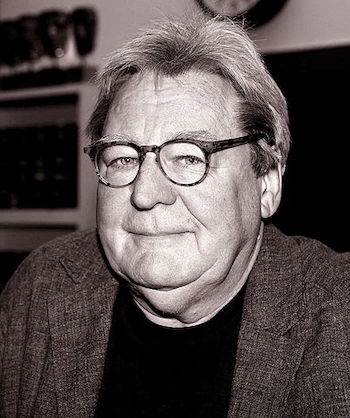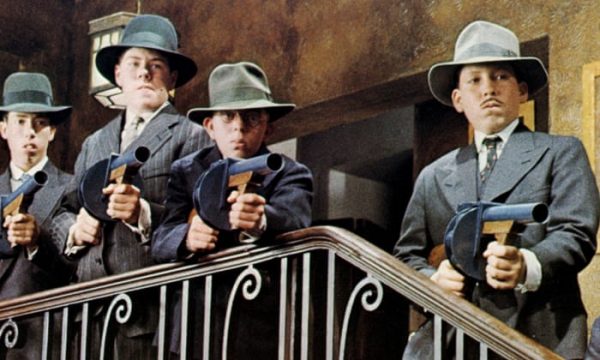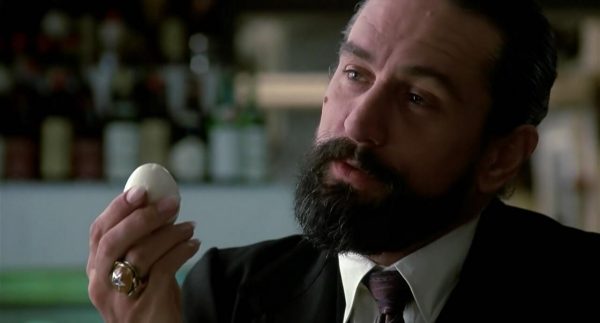Arts Remembrance: Director Alan Parker — A Sensitive and Versatile Master of Film
By Peg Aloi
It gradually became clear to me by the mid-’80s that Alan Parker films were, more than those of any other filmmaker, an integral part of my identity as a film lover.

The late Alan Parker in 2012.
As a teenager, I wasn’t terribly aware of world cinema in terms of the names of directors or whether a movie was good or not. But I enjoyed films, and I distinctly recall the first time I made a point of finding out a director’s name — it was Alan Parker, who passed away at the age of 76 on July 31. The time was 1980, I was a junior in high school, and the movie was Fame. All the theater and music kids in my school went nuts over it. I remember attending an audition for SUNY Purchase in Manhattan, and meeting a girl my age who was at the school portrayed in the film. In my senior year, when it was announced the film would be made into a TV series, I created a fake letter that supposedly came from Bruce Paltrow’s office (who at the time was producing White Shadow). It said his production company was looking for young actors to star in the show. They wanted to set up an audition at my school. I thought it was a pretty good fake — my choir director was impressed.
Of course, I loved Fame for its exuberance and its beauty, and the wonderful musical numbers. It didn’t matter to me that it wasn’t really a proper musical. Parker’s approach was new to me: that characters could perform songs in a movie and these numbers would naturally develop a story that revolved around (in this case) performers. And the songs didn’t have to be relayed in the spectacular yet artificial way that musicals usually offered them. Along with Fame‘s moments of joy and triumph, there were moments of pain and longing, loneliness and humiliation. It was the film’s embrace of darkness that stayed with me. The inclusion of moments of self-doubt and despair that come when your dreams don’t come true — along with the realization that they probably never will.
I dimly recalled having seen Bugsy Malone (1976) prior to Fame, and later realized it utilizes the same musical conceit. I did not grow to fully appreciate the genius of Bugsy Malone until graduate school. Not only did I learn to value the fantastic soundtrack by Paul Williams, but the sheer brilliance, at least in the ’70s, of having the roles of mobsters and their sophisticated lady friends played by child actors. It gradually became clear to me by the mid-’80s that Alan Parker films were, more than those of any other filmmaker, an integral part of my identity as a film lover. His movies made me slowly come to see that cinema could be a powerful expression of culture and history.
The next Parker film I recall seeing (on HBO, several years after its theatrical release) was Midnight Express (1978) from Oliver Stone’s screenplay of Billy Hayes’s autobiographical book. The movie is based on Hayes’s experience in a Turkish prison after being caught smuggling drugs. It starred one of my favorite actors at the time, Brad Davis, who briefly appeared in a racy soap opera I used to watch with my mom called How to Survive a Marriage. In addition to Midnight Express, Davis also appeared in a small role in Chariots of Fire, which swept the Oscars, as well as in the art house hit Rosalie Goes Shopping. His promising career was cut short — as were those of many of his peers — when he contracted AIDS and died a short time thereafter.

Kids with guns in a scene from Alan Parker’s Bugsy Malone.
There was Pink Floyd: The Wall (1982). An event much anticipated and ballyhooed at the time. Of course, there was considerable skepticism whether a filmed version, even one full of inventive animation, would do justice to a highly praised, blisteringly sociopolitical album that for months topped the international charts. We shouldn’t have doubted that in Parker’s hands the film would be a thrilling, moving, and utterly riveting experience. The casting was a stroke of genius. Young Bob Geldof (then the lead singer of The Boomtown Rats), who had never done any film acting, was picked to play Pink, the rising young rock star whose dissolute lifestyle and personal demons nearly destroy him. A college friend and classmate of mine — who later went on to be a choreographer on Broadway — was inspired by the film to choreograph her own piece to Comfortably Numb for our college dance department.
There was 1984’s Birdy, a darkly humorous and tender film about two friends who go to war in the ’50s, one of whom becomes delusional, believing he is a bird. The chemistry between Nicholas Cage and Matthew Modine is electrifying. This was the first film I recall seeing, apart from Heroes (1977) starring Henry Winkler, that dealt seriously with the trauma of war and its indelible impact on young soldiers. Birdy also has one of the most absolutely perfect endings I’ve ever seen — period. It also is perhaps the quintessential expression of a “needle drop.”
Angel Heart came out in 1987. I saw it a couple of years later, and it obsessed me for a time in the way that only horror films starring Mickey Rourke could do. I still consider this one of Rourke’s best performances; the film’s rather understated horror is crafted by Parker’s celebrated ability to say so much with small touches of visual and aural acuity. The smoky occult shop where Rourke’s character purchases High John root; the dreamy expression on young Lisa Bonet’s face, her exquisite beauty overwhelming her shabby clothing and surroundings; the low key humor of DeNiro’s devil, smelling of sulfur, his eyes twinkling, as he unpeels and devours yet another hard boiled egg. In that moment, we can almost catch that “rotten egg” whiff of sulfur: an imagined sensory jolt that transcends cinema’s expression of only two of our five senses: in Sir Alan Parker’s oeuvre, such meta-moments are transcendent.
Parker’s treatment of music and film was a trademark that paved the way for what many would call his most popular and best-loved film, 1991’s The Commitments. Full of crackling sexual tension, and exploding with musical creativity, this feel-good saga of a ragtag blues band made up of working-class Dublin kids still stands as one of the best nonmusical musicals ever. Its success spawned a brilliant indie film starring one of its performers (Glen Hansard) as a real-life version of himself, a Dublin street busker who collaborates with a Czech immigrant musician, 2007’s Once, which later went on to become a smash Broadway play.

Robert De Niro peeling an egg in Alan Parker’s Angel Heart.
There were other equally noteworthy Parker films. The violent, poignant, and beautifully acted Shoot the Moon (1982, impossibly coming out the same year as the Pink Floyd opus); 1988’s incendiary story of racism in the deep South, Mississippi Burning, starring acting heavyweights Gene Hackman, Willem Dafoe, Brad Dourif, and Frances McDormand. Then there was the weird and strangely erotic The Road to Wellville (1994). In 1996 came the ambitious Evita, a screen version of an award-studded stage musical by Andrew Lloyd Webber and Tim Rice, starring Madonna as the eponymous Argentinian political firebrand. (She very nearly filled Patti Lupone’s enormous shoes.) In 1999 Angela’s Ashes arrived, another book to screen journey based on an international best seller.
Parker’s final film was 2003’s The Life of David Gale, a thriller about a capital punishment activist who murders someone. It felt like a departure from Parker’s usual m.o.: less subtle, more histrionic. Many lovers of Parker’s film work wished there had been more. But it is hard to imagine a filmmaker who could boast a more varied portfolio, with admirable accomplishments that stretch across so many genres. Yet all these efforts bear Parker’s signature look and feel, his revelations of human feeling, rendered with a minimum of fanfare, balanced by his knowing precisely when a scene needed to be put across with a grandiose splash, and when it should quietly seep into our consciousness. I am fortunate to have had my love of film nurtured by such a sensitive and versatile master.
Peg Aloi is a former film critic for the Boston Phoenix and member of the Boston Society of Film Critics. She taught film studies in Boston for over a decade. She writes on film, TV, and culture for web publications like Vice, Polygon, Bustle, Mic, Orlando Weekly, Crooked Marquee, and Bloody Disgusting. Her blog “The Witching Hour” can be found at themediawitch.com.
